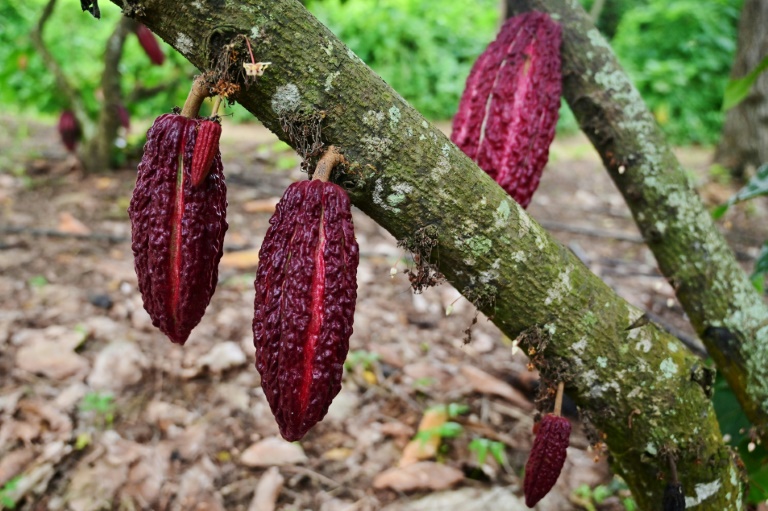Business
Nestlé Develops Innovative Method to Maximize Cocoa Yields

Nestlé has introduced a groundbreaking technique aimed at increasing cocoa yields as climate change continues to impact farmers’ productivity. Announced on March 13, 2024, the Swiss food giant revealed that it is developing a method to utilize up to 30 percent more of the cocoa fruit compared to traditional chocolate production. Typically, only the cocoa beans from inside the pod are used, leaving behind the pulp, placenta, and husk largely discarded.
The innovative method involves collecting all parts of the cocoa pod as a wet mass, which then undergoes a natural fermentation process. This approach, according to Nestlé, unlocks the essential chocolate flavor. After fermentation, the mass is ground, roasted, and dried into chocolate flakes, allowing for chocolate production without compromising on taste. This technique not only reduces waste but also enhances the yield and economic value for farmers.
Louise Barrett, head of the Nestlé research and development centre for confectionery in York, England, stated, “With climate change increasingly affecting cocoa yields around the world, we are exploring innovative solutions that could help cocoa farmers maximise the potential of their harvests.” She added that while this project is still in the pilot stage, Nestlé is investigating how to scale up the innovation for broader application.
Rising Cocoa Prices and Climate Challenges
The cocoa market has faced significant challenges in recent years. Prices, which had remained stable for a decade, began to surge in early 2023. A tonne of cocoa was valued at approximately £1,900 (about $2,560) on the London commodities market in January 2023. By January 2024, that price skyrocketed to £3,800 and reached an unprecedented high of over £9,000 in December 2023.
This dramatic increase is attributed to a series of poor harvests in leading cocoa-producing countries, particularly the Ivory Coast and Ghana. Factors contributing to the decline included severe weather conditions such as heavy rains, an outbreak of cocoa pod disease, and subsequent droughts.
A study by the Climate Central research group highlighted that excessive heat exacerbates the challenges faced by cocoa growers. The report found that climate change has added an additional three weeks of temperatures exceeding 32°C during the crucial growing season from October to March. These conditions are above the optimal levels for cacao trees, further complicating the cultivation process.
The surge in cocoa prices has had a mixed impact on demand. While higher prices dampened consumption, they also compelled farmers to invest more resources into cocoa cultivation. Recently, this led to a stabilization of prices, with reserves being built up for the first time in four years. As of March 2024, the price per tonne has decreased to around £5,600.
Nestlé’s commitment to innovative solutions reflects a broader industry trend towards sustainability and efficiency in cocoa production. As the challenges of climate change continue to unfold, the food giant’s efforts may not only benefit their business but also provide essential support for cocoa farmers struggling to adapt to changing environmental conditions.
-

 Education3 months ago
Education3 months agoBrandon University’s Failed $5 Million Project Sparks Oversight Review
-

 Science4 months ago
Science4 months agoMicrosoft Confirms U.S. Law Overrules Canadian Data Sovereignty
-

 Lifestyle3 months ago
Lifestyle3 months agoWinnipeg Celebrates Culinary Creativity During Le Burger Week 2025
-

 Health4 months ago
Health4 months agoMontreal’s Groupe Marcelle Leads Canadian Cosmetic Industry Growth
-

 Science4 months ago
Science4 months agoTech Innovator Amandipp Singh Transforms Hiring for Disabled
-

 Technology4 months ago
Technology4 months agoDragon Ball: Sparking! Zero Launching on Switch and Switch 2 This November
-

 Education4 months ago
Education4 months agoRed River College Launches New Programs to Address Industry Needs
-

 Technology4 months ago
Technology4 months agoGoogle Pixel 10 Pro Fold Specs Unveiled Ahead of Launch
-

 Business3 months ago
Business3 months agoRocket Lab Reports Strong Q2 2025 Revenue Growth and Future Plans
-

 Technology2 months ago
Technology2 months agoDiscord Faces Serious Security Breach Affecting Millions
-

 Education4 months ago
Education4 months agoAlberta Teachers’ Strike: Potential Impacts on Students and Families
-

 Education3 months ago
Education3 months agoNew SĆIȺNEW̱ SṮEȽIṮḴEȽ Elementary Opens in Langford for 2025/2026 Year
-

 Science4 months ago
Science4 months agoChina’s Wukong Spacesuit Sets New Standard for AI in Space
-

 Business4 months ago
Business4 months agoBNA Brewing to Open New Bowling Alley in Downtown Penticton
-

 Business4 months ago
Business4 months agoNew Estimates Reveal ChatGPT-5 Energy Use Could Soar
-

 Technology4 months ago
Technology4 months agoWorld of Warcraft Players Buzz Over 19-Quest Bee Challenge
-

 Business4 months ago
Business4 months agoDawson City Residents Rally Around Buy Canadian Movement
-

 Technology2 months ago
Technology2 months agoHuawei MatePad 12X Redefines Tablet Experience for Professionals
-

 Technology4 months ago
Technology4 months agoFuture Entertainment Launches DDoD with Gameplay Trailer Showcase
-

 Top Stories3 months ago
Top Stories3 months agoBlue Jays Shift José Berríos to Bullpen Ahead of Playoffs
-

 Technology4 months ago
Technology4 months agoGlobal Launch of Ragnarok M: Classic Set for September 3, 2025
-

 Technology4 months ago
Technology4 months agoInnovative 140W GaN Travel Adapter Combines Power and Convenience
-

 Science4 months ago
Science4 months agoXi Labs Innovates with New AI Operating System Set for 2025 Launch
-

 Technology4 months ago
Technology4 months agoNew IDR01 Smart Ring Offers Advanced Sports Tracking for $169










